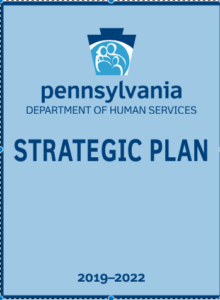DHS Unveils Strategic Plan
Pennsylvania’s Department of Human Services has a new strategic plan for 2019 through 2022.
 While DHS’s area of endeavor is broad and goes beyond health care, Medicaid is an important aspect of its work and that importance is reflected in the plan, which includes descriptions of DHS’s ambitions in the following areas:
While DHS’s area of endeavor is broad and goes beyond health care, Medicaid is an important aspect of its work and that importance is reflected in the plan, which includes descriptions of DHS’s ambitions in the following areas:
- Provide every child with a strong foundation for physical and behavioral well-being
- Bend the health care cost curve
- Drive innovative whole-person care
- Holistically assess needs and connect to resources
- Address the social determinants of health
- Expand health care beyond the doctor’s office and into the places people live, work, and play
- Coordinate physical health care, behavioral health care, and long-term services and supports
- Promote health equity
- Lead the health care system toward value-based purchasing coordinated across payers
- Serve more people in the community
- Enhance access to health care and services that help Pennsylvanians lead healthy, productive lives
- Coordinate services seamlessly across programs and agencies
- Expand services and supports for individuals with mental illness
- Expand services and supports for individuals with substance use disorder
Learn more about what Pennsylvania has in mind for its Medicaid program in the coming years, and for the Pennsylvania safety-net hospitals that serve so many participants in that program, by reading DHS’s new strategic plan for 2019 through 2022.
 Included in this month’s edition are articles about:
Included in this month’s edition are articles about: As envisioned by the state, the current program, in which individual counties contract independently with transportation providers to serve their residents on Medicaid, was to be replaced by a regional approach in which the state contracts with three vendors to serve all of Pennsylvania. Objections by members of the state legislature and county officials, however, led to legislation that requires the Department of Human Services, Department of Transportation, and Department of Aging to study the implications of such a change for patients and taxpayers and to report their preliminary findings to the legislature in September.
As envisioned by the state, the current program, in which individual counties contract independently with transportation providers to serve their residents on Medicaid, was to be replaced by a regional approach in which the state contracts with three vendors to serve all of Pennsylvania. Objections by members of the state legislature and county officials, however, led to legislation that requires the Department of Human Services, Department of Transportation, and Department of Aging to study the implications of such a change for patients and taxpayers and to report their preliminary findings to the legislature in September. The Safety-Net Association of Pennsylvania has prepared a detailed review of those provisions. Officials of safety-net hospitals who would like to receive a copy of this memo may request one by using the “contact us” link on the upper right-hand corner of this screen.
The Safety-Net Association of Pennsylvania has prepared a detailed review of those provisions. Officials of safety-net hospitals who would like to receive a copy of this memo may request one by using the “contact us” link on the upper right-hand corner of this screen. HealthChoices, Pennsylvania’s Medicaid managed care program, seeks to purchase 7.5 percent of Medicaid services through value-based purchasing arrangements in calendar year 2017, 15 percent in 2018, and 30 percent in 2019. The Hospital Quality Incentive Program seeks to facilitate achieving these goals.
HealthChoices, Pennsylvania’s Medicaid managed care program, seeks to purchase 7.5 percent of Medicaid services through value-based purchasing arrangements in calendar year 2017, 15 percent in 2018, and 30 percent in 2019. The Hospital Quality Incentive Program seeks to facilitate achieving these goals. Current guidelines are evolving both in the state and nationally, with medical authorities and federal regulators weighing in with their views. Recently, an advisory committee to the Pennsylvania Department of Human Services offered its own recommendations for criteria for prescribing the most expensive drugs.
Current guidelines are evolving both in the state and nationally, with medical authorities and federal regulators weighing in with their views. Recently, an advisory committee to the Pennsylvania Department of Human Services offered its own recommendations for criteria for prescribing the most expensive drugs.